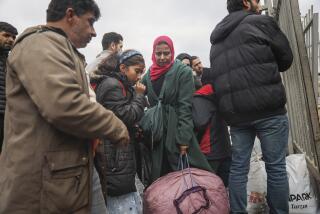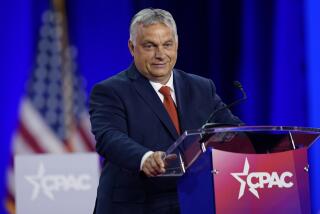Erdoganâs White House visit renews tensions over Turkeyâs aggression
WASHINGTON â Turkish President Recep Tayyip Erdoganâs visit to the White House drew sharp bipartisan criticism from Congress and rallied protesters across the capital on Wednesday who decried Turkeyâs recent military foray into northeastern Syria.
Erdogan arrived at the White House under heavy security and was largely shielded from the view of the several hundred demonstrators, including Armenian, Kurdish, Jewish and Christian groups, who gathered in nearby Lafayette Park waving signs and chanting, âTurkey out of Syria!â and âErdogan go home!â
But in a brief news conference after their meeting, President Trump praised the Turkish leader, saying he was a âbig fanâ of Erdoganâs.
The Turkish president called Trump âmy dear friend.â But he also publicly said that he had returned a letter Trump sent him last month asking him to not invade Syria. In the letter, which the White House released, Trump urged Erdogan to not be âa tough guyâ and admonished him: âDonât be a fool.â
Reports from Turkey at the time cited government officials as saying that Erdogan tossed the missive in the trash.
On Wednesday, asked about the letter and with Trump standing at his side, Erdogan said, âWe gave back the letter we received.â
A long list of actions by Turkey â a NATO ally â has troubled Congress and human rights organizations. In Syria, Turkish army units and Turkish-backed militias have been accused of possible war crimes in the killing of Kurds, who led the U.S.-backed fight against Islamic State militants. Erdogan sent his troops into Syria last month when Trump abruptly announced the withdrawal of U.S. forces â a decision that was met with unusually fierce opposition from Republicans as well as Democrats.
In Turkey, Erdogan has imprisoned or fired tens of thousands of dissidents, civil servants, police, professors and military officers after a failed coup against him in 2016. The president has manipulated elections to stay in power, according to pro-democracy organizations in Ankara. Turkey is the worldâs leading jailer of journalists.
Turkey also has turned increasingly toward Russia, recently buying military equipment â the S-400 surface-to-air missile system â from Moscow, which experts say may not be compatible with equipment the North Atlantic Treaty Organization already uses.
In their news conference, the two leaders said they had discussed the Russian weapons system, but they clearly had not reached agreement.
Erdogan also defended his countryâs military operations in Syria, saying they were aimed at wiping out âterrorists,â a term he used to include both Islamic State and some of the Kurdish factions allied with the United States.
Numerous congressional officials demanded that the invitation be rescinded and expressed concern that Trump had not revealed the contents of his phone call with Erdogan that apparently gave the Turkish leader a green light to invade Syria.
âItâs inexcusable that this visit is going forward despite the egregious behavior of President Erdogan,â said Sen. Jeanne Shaheen (D-N.H.). âPresident Trump is once again coddling an authoritarian leader and sending a terrible message. I urge congressional leadership to seek a full accounting of discussions.â
Some Republicans agreed.
âPresident Erdoganâs visit comes during a deeply troubling time in our bilateral relationship,â said Rep. Michael McCaul (R-Texas), ranking Republican on the House Foreign Affairs Committee. âPresident Erdogan must reverse course and recommit to NATO and our bilateral partnership.â
Seventeen Republican and Democratic members of Congress wrote Trump last week urging him to call off the visit.
âPresident Erdoganâs calamitous actions in Syria follow a long list of disconcerting steps under his leadership,â they wrote, accusing Erdogan of dividing NATO, harming U.S. national security and unleashing a humanitarian disaster for Kurds and Syrians.
U.S.-Turkish tensions are extremely high. Trump, however, apparently seeks to capitalize on what he considers to be a close personal relationship with Erdogan.
Trumpâs real estate business has extensive interests in Turkey and ties with the Turkish government.
In the news conference, in which he urged Erdogan to call on âfriendly reportersâ and seemed also to follow his own advice, Trump said he was confident Turkey would âcontinue to uphold what itâs supposed to upholdâ but also needed European help in repatriating Islamic State fighters and refugees from Syria.
Administration officials said a one-on-one meeting between the two leaders was necessary to iron out details of the next steps in Syria: what the Turkish presence will look like, whether Kurds will be allowed to remain and how to prevent the resurgence of Islamic State.
âDonât look at these things as rewards; theyâre the execution of diplomacy,â said a senior State Department official, briefing reporters on condition of anonymity.
Persuading Turkey to move away from the S-400 purchase is a priority, administration officials said. They also insisted the United States had not abandoned the Kurds. Trump has said a small contingent of U.S. troops will remain in Syria to guard oil fields.
âItâs fair to say that there are irritants on both sides,â a senior administration official, who also briefed reporters on condition of anonymity, said in a conference call. âAnd itâs one reason we think this meeting is so important that we are together at the highest level with our Turkish counterparts to ... figure out where we have overlap so that we can make progress.â
Turkish officials concurred.
âWhatâs important is [the] U.S.-Turkey relationship, which has gone through many ups and downs and challenges,â Can Oguz, Turkeyâs consul general in Los Angeles, told The Times. âThose challenges may seem insurmountable, but we have strongâ ties, he said.
During a visit by Erdogan to Washington in 2017, his bodyguards assaulted peaceful demonstrators and other opponents outside the residence of the Turkish ambassador and at a think tank where the Turkish leader was to speak. More than a dozen people, including Washington police officers, were injured. Four Turkish security guards remain under criminal indictment in Washington but were rushed out of the country before they could be detained.
Rep. Liz Cheney (R-Wyo.), in a letter to Secretary of State Michael R. Pompeo, asked that U.S. law enforcement keep close tabs on Erdoganâs security detail this time.
âThe Erdogan regimeâs use of violence against innocent civilians anywhere is inhumane, uncivilized and unacceptable,â she said.
Wednesdayâs demonstrators were also gathering outside the Turkish ambassadorâs residence, vowing to not be intimidated by the earlier experience.
Aram Hamparian, executive director of the Armenian National Committee of America and a leader of the demonstrations, said he was especially disappointed that Trump never condemned the violence by Erdoganâs guards.
Trump âis giving him a level of respect he has not earned,â Hamparian said.
Erdogan, in remarks to the press, complained bitterly about a recent declaration by the U.S. House recognizing the mass killings of Armenians in the Ottoman Empire in the early 1900s as a genocide. Turkey has acknowledged many died during that period, but blames primarily disease and hunger.
Times staff writer Melissa Etehad in Los Angeles contributed to this report.
More to Read
Sign up for Essential California
The most important California stories and recommendations in your inbox every morning.
You may occasionally receive promotional content from the Los Angeles Times.










